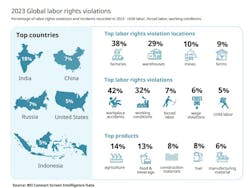As supply chains have continued to expand across the world, hidden within these complex networks are worker exploitations including human trafficking, child labor, and forced labor according to a recent report from BSI.
The report, From policy to practice: Fight exploitation throughout global supply chains, cites statistics from the International Labour Organization which reports that nearly 50 million people worldwide are trapped in some form of modern slavery and 27.6 million under forced labor.
This exploitation can take many forms including:
Human trafficking: The recruitment, transportation, and harboring of individuals through force or deception for exploitation.
Forced labor: Work or service extracted from a person under the threat of penalty and for which the person has not offered themselves voluntarily.
Debt bondage: When a person is forced to work to pay off a debt, losing control over their conditions of work and the debt repayment.
Looking specifically at the US, in 2023, the US accounted for 5% of global human rights and labor violations recorded.
The top locations included factories (38%) and warehouses (29%).
The top violations were workplace accidents (42%) and working conditions (32%).
And the top products were in agriculture (14%) and food & agriculture (13%), and construction materials (8%).
Globally, the graph below illustrates the conditions.
Global Reporting in 2025
In 2025 global regulations are expected to further tighten, the report notes, as countries are taking proactive efforts to combat modern slavery in supply chains.
Some of the largest shifts in regulatory compliance will include mandatory reporting across multiple jurisdictions.
These include:
US
US Uyghur Forced Labor Prevention Act
California Transparency in Supply Chains Act
Other Countries
EU CSRD (Corporate Sustainability Reporting Directive)
UK Modern Slavery Act EU CSDDD (Corporate Sustainability Due Diligence Directive)
French Corporate Duty of Vigilance Plan
In addtion to reporting, other actions being taken include:
Government registries: Many countries are introducing public registries to track and hold companies accountable for modern slavery disclosures.
Stricter enforcement: Governments are increasing penalties for non-compliance, including fines, civil liability, and product import bans.
Due diligence and risk assessments: Companies must conduct thorough due diligence and report on all efforts to eliminate forced labor from supply chains.
“The journey toward eradicating modern slavery is not without its challenges,” said Ryan Lynch, practice director sustainability, BSI Consulting, in a statement. “It requires an unwavering commitment to ethical practices, a deep understanding of the complexities of global supply chains, and the willingness to evolve.
"Organizations that establish credible, scalable management systems focused on protecting workers throughout the value chains demonstrate leadership and contribute to a more just and equitable global economy.”
His group produces a Trafficking Supply Chain Slavery Patterns Index.





